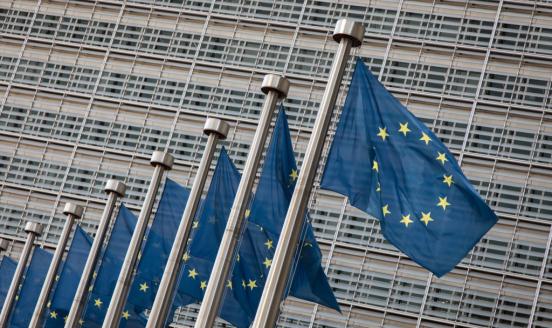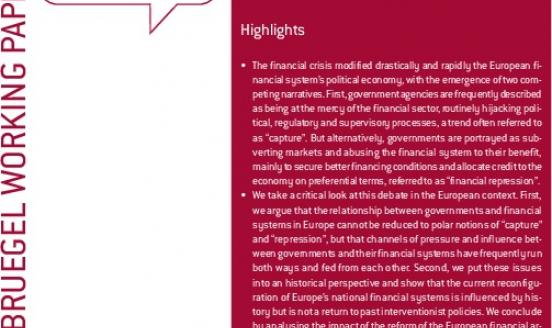The Weekender: options for ESM/EFSF and the Irish/ECB promissory note deal
Dear All, Financial markets are getting more concerned about Europe again, and about Spain in particular. It is a call to end the complacency that s
Dear All,
Financial markets are getting more concerned about Europe again, and about Spain in particular. It is a call to end the complacency that set in since December. And it is timely considering the ongoing discussions on the ESM as well as on the ratification of the fiscal compact. A return to the lost sense of urgency is the only thing that can get Europe moving again.
Meanwhile, we are in the midst of appointment negotiations both internationally and in Europe. President Obama pulled out an interesting compromise by nominating Jim Yong Kim, a Korean born American at the helm of the World Bank. I believe this will increase the pressure on Europeans to go a step further when Lagarde’s term at the head of the IMF ends. This is also likely to reopen the debate about the pooling of Europeans chairs on the executive board.
In the meantime, Europe is going through its own appointments frenzy, as the chairmanship of the Eurogroup is up for grabs. Schauble is the frontrunner candidate and he seems to even be supported by the French, who probably, secretly hopes that the seat would become vacant after the German elections in 2013. The Presidency of the European Investment Bank has been attributed to Werner Hoyer against its former Vice President Philippe De Fontaine Vive Curtaz who is now seeking to replace Thomas Mirow at the head of the EBRD. Meanwhile Spain is pressing hard to keep a seat on the Executive Board of the ECB when the term of Gonzalez Paramo ends in May.
I will focus this week on:
1. Options for ESM/EFSF
2. The Irish/ECB Promissory Note deal
1. Options for ESM/EFSF
European financial safety nets remain a work in progress. The international community is exerting pressure such that these safety nets are as robust and effective as possible such that its own contribution via the IMF is lessened and the debate about the ESM is essential, in particular its final size.
This is the topic of negotiation for this week’s eurogroup/ECOFIN on 29th where minister will have to decide to expand or not the size of the ESM and/or to extend the life of the EFSF.
The Eurogroup Working Group has laid out 3 options to increase the resources for ministers:
- Combining the EFSF used funds with the new ESM resources
The EFSF would no longer be available for new lending after the entry into force of the ESM Treaty on 1 July 2012, but it would be used to fulfill its existing commitments of about €200bn beyond 2013. The ESM would have its own 500bn of resources. The total European firewall would be about 700bn. - Combining the full EFSF and full ESM capacity
The EFSF would remain available for new lending after the entry into force of the ESM Treaty on 1 July 2012, fulfilling its existing commitments of about 200bn and providing new lending capacity of about 240bn which would increase the total lending capacity to until 30 June 2013. Thereafter, the EFSF lending capacity would no longer be available and the total lending capacity of the European firewall would fall to 740bn. - Transforming the unused EFSF guarantees into ESM capital
The currently unused EFSF guarantee commitments of about €240bn would be turned into additional subscribed capital of the ESM implying a new ESM lending capacity of approximately €940bn. This would require a new parliamentary approval process would increase permanently the ESM’s lending capacity. The total firewall would then be expanded to 940bn.
These 3 options have pros and cons and they also fit in an international context where essentially the expectations is that Europeans would come up with a firewall that would be symbolically close to 1 trillion USD. Option 2 and 3 achieve this and should allow the Ministerial G20 scheduled for April 19th to unlock a deal for an increase in the IMF’s resources.
Interestingly, if option 3 is obviously the most politically costly, it also has some interesting accounting benefits. Indeed, EFSF guarantees are fiscally more intensive than ESM capital contributions. According to a preliminary opinion by eurostat, EFSF guarantees are debt generating for the guarantors from the moment the EFSF issues to provide financial assistance while for the ESM, member states incur debt only when they contribute to the paid in capital (80bn) and then only after a loss is realized and member states need to shore up the ESM through a capital call. So the ESM can actually lend a large amount of capital without materially impacting its shareholders debt to GDP ratio. I attach a more detailed paper on the three options leaked a few days ago.
2. The Irish/ECB Promissory Note deal
I have neglected the Irish debate on its promissory note over the last few months. The annual payment of this promissory note falls due on March 31st and is the subject of intense negotiations between Ireland and the ECB. It is extremely important for the future of financial policy in Europe over the medium term and in the short term for the good standing of the Irish program.
Essentially, during the bail out of Anglo Irish Bank and Irish Nationwide Building Society (INBS) which have been merged to form the Irish Bank Resolution Corporation (IBRC), the Irish government has incurred some 31bn euros of debt largely used to pay off unsecured creditors.
In effect, the Irish Government didn’t provide cash but issued promissory notes that allowed IBRC to obtain cash from the Central Bank of Ireland through the emergency liquidity assistance(ELA). It is important to note that therefore the Governing Council had to approve (by a 2/3rd majority) and probably largely drive this process.
It is also paramount to remember that the Irish government had expressed then the desire to restructure and haircut senior and subordinated creditors of these institutions in order to protect Irish taxpayers from what it considered undue costs from bailing out the banking system. This policy option had been strongly opposed by the ECB for fear of disastrous effects on financial stability across the euro area.
This was probably the right thing to do but it clearly imposed an undue financial on Irish tax payers for the sake of preserving financial stability in the euro area as a whole: a clear consequence of the absence of supranational resolution framework. Indeed, the only thing that Europe has to organize these situations is a loose Memorandum of Understanding signed in 2005 and updated in 2008.
However, it seems natural that the ECB, acting in the name of the community, would agree on a fairer burden sharing of the benefits of financial stability than the one set fort by the current agreement. But the ECB is also concerned with moral hazard considering other countries are currently making ample use of the ELA.
But although, ELA is a national prerogative (and therefore the risk has to be born nationally), the statutes of the ECB do provide some leeway to compensate the Irish Central Bank from losses incurred. In particular, Article 32.4 states “The Governing Council may decide that national central banks shall be indemnified against costs incurred in connection with the issue of banknotes or in exceptional circumstances for specific losses arising from monetary policy operations undertaken for the ESCB.”
That being said, there is both a technical and a political debate about the restructuring of the promissory note. Ideally for the Irish authority, the goal would be to delay repayments as much as possible. This would provide both some cash flow relief (3.1bn each year until 2023 and then less) and NPV reduction relief.
What I think makes sense is to restructure the promissory note in such a way that Ireland doesn’t have it service any of it for so long as it is under a program and then that its repayment is contingent on a certain level of GDP growth. In essence, this would align incentives both for the ECB and Ireland to kick start the recovery and would in the meantime provide cash flow relief and NPV reduction.
The current argument used by the ECB to avoid negotiating a deal is what Karl Whelan in a brilliant and extensive note called the What’s your problem? argument, that essentially argues that so long as the programme is on track there is no reason to reduce pressure on Irish tax payers and reopen such a key aspect of the programme.
I strongly agree with Karl that this approach that favours brinksmanship over timely negotiation is absurd. The moral hazard argument for renegotiating the promissory note is weak because even if Ireland was to set a precedent, the real pressure that the ECB needs to put is not on Ireland or on Greece but on all member states to agree on a banking resolution framework that goes beyond the joke of a Memorandum of Understanding that currently serves in its stead.
What Ireland is going through now with its promissory note negotiation is not only key for the success and the democratic acceptance of its adjustment programme, it is also fundamental in setting the foundation of a real and effective financial policy for the euro area. Ireland should be encouraged on both counts.
Happy to have your thoughts as usual,
Best Regards,
Shahin Vallée


